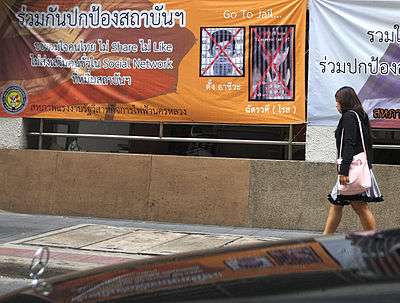Internet police
| Internet |
|---|
 An Opte Project visualization of routing paths through a portion of the Internet |
|
|
Internet police is a generic term for police and secret police departments and other organizations in charge of policing Internet in a number of countries.[1] The major purposes of Internet police, depending on the state, are fighting cybercrime, as well as censorship, propaganda, and monitoring and manipulating the online public opinion.
Canada
Several attempts have been made to introduce tools that would allow law enforcement and security agencies to monitor online communications without a warrant, the latest of which was bill C-30, tabled in February 2012[2] which was abandoned because of strong public opposition.[3]
Estonia
The Computer Emergency Response Team of Estonia (CERT Estonia), established in 2006, is an organization responsible for the management of security incidents in .ee computer networks. Its task is to assist Estonian Internet users in the implementation of preventive measures in order to reduce possible damage from security incidents and to help them in responding to security threats. CERT Estonia deals with security incidents that occur in Estonian networks, are started there, or have been notified of by citizens or institutions either in Estonia or abroad.[4]
India
Cyber Crime Investigation Cell[5] is a wing of Mumbai Police, India, to deal with Cyber crimes, and to enforce provisions of India's Information Technology Law, namely, The Information Technology Act, 2000, and various cyber crime related provisions of criminal laws, including the Indian Penal Code. Cyber Crime Investigation Cell is a part of Crime Branch, Criminal Investigation Department of the Mumbai Police.
Andhra Pradesh Cyber Crime Investigation Cell[6] is a wing of Hyderabad Police, India, to deal with Cyber crimes.
Indian Computer Emergency Response Team (CERT-In) also deals with Cyber Security. "Cyber Police", the Hi-Tech Crime Enquire Cell of the Kerala Police.[7]
Netherlands
Dutch police were reported to have set up an Internet Brigade to fight cybercrime. It will be allowed to infiltrate Internet newsgroups and discussion forums for intelligence gathering, to make pseudo-purchase and to provide services.[8]
People's Republic of China
It has been reported[9] that in 2005, departments of provincial and municipal governments in mainland China began creating teams of Internet commentators from propaganda and police departments and offering them classes in Marxism, propaganda techniques, and the Internet. They are reported to guide discussion on public bulletin boards away from politically sensitive topics by posting opinions anonymously or under false names.
Chinese Internet police also erase anti-communist comments and posts pro-government messages. Chinese Communist Party leader Hu Jintao has declared the party's intent to strengthen administration of the online environment and maintain the initiative in online opinion.[10]
Thailand

After the 2006 coup in Thailand, the Thai police has been active in monitoring and silencing dissidents online. Censorship of the Internet is carried out by the Ministry of Information and Communications Technology of Thailand and the Royal Thai Police, in collaboration with the Communications Authority of Thailand and the Telecommunication Authority of Thailand.[11]
On 29 April 2010, Wipas Raksakulthai was arrested on charges of lèse majesté following a post to his Facebook account criticizing King Bhumibol.[12] In May 2011, Amnesty International named him a prisoner of conscience."[13]
United Kingdom
The Internet Watch Foundation (IWF) is the only recognised organisation in the United Kingdom operating an Internet ‘Hotline’ for the public and IT professionals to report their exposure to potentially illegal content online. It works in partnership with the police, Government, the public, Internet service providers and the wider online industry.
United States
See also
- Internet service provider#Law enforcement and intelligence assistance
- Forum moderator, an Internet forum user who enforces the forum's rules
References
- ↑ Jennifer Coleman, "Internet Police Patrol Cyberspace for Child-Sex Stalkers", Associated Press Online, March 14, 2000.
- ↑ "Legislative Summary of Bill C-30". Parliament of Canada. Retrieved 13 August 2013.
- ↑ "Government killing online surveillance bill". CBC. Retrieved 13 August 2013.
- ↑ "Estonian Informatics Centre - About CERT Estonia". Ria.ee. Retrieved 2013-06-24.
- ↑ "Indian Cyber Crime Investigation Cell Official Website". Cybercellmumbai.com. Retrieved 2013-06-24.
- ↑ "Hyderabad Police Cyber Crime Investigation Cell Official Website". Hyderabadpolice.gov.in. Retrieved 2013-06-24.
- ↑ "Official website of Kerala Police". keralapolice.org.
- ↑ Jelle van Buuren (26 August 2001). "Dutch Police expected to check 300.000 Internet-users in 2004". heise.de.
- ↑ Jonathan Watts. "China's secret internet police target critics with web of propaganda". the Guardian.
- ↑ China's Hu vows to "purify" Internet, Reuters, January 24, 2007
- ↑ Brad Adams, Asia director at Human Rights Watch (2007-05-25). "Thailand: Military-Backed Government Censors Internet". Hrw.org. Retrieved 2013-06-24.
- ↑ "Tracking digital footprints: Police are becoming increasingly adept at tackling online crimes". Bangkok Post. 7 July 2010. Retrieved 15 May 2011.
- ↑ Pravit Rojanaphruk (14 May 2011). "Amnesty International names Thailand's first 'prisoner of conscience'". The Nation. Retrieved 15 May 2011.
External links
- Cybercrime.gov US Department of Justice CCIPS
- Cybercellmumbai.com Indian Cyber Crime Investigation Cell
- US CERT United States Computer Emergency Readiness Team (US-CERT)
- US Secret Service Computer Fraud
- On Guard OnGuardOnline.gov provides practical tips from the federal government and the technology industry to help you be on guard against Internet fraud, secure your computer, and protect your personal information.
- RCMP Computer Crime Prevention Royal Canadian Mounted Police
- CERT Estonia The Computer Emergency Response Team of Estonia
- Tallahassee Internet Police
